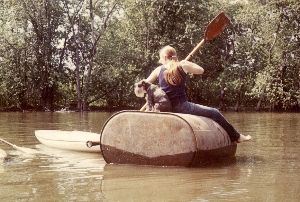
Valerie and Samantha playing on the
Desplaines River, Lemont, Illinois, about 1979
Rivers are always moving. They can be ferocious or calm and serene, but they are never stagnant. Every river has a beginning and an end, whether the water flows for a few yards or many miles. It offers different views to those that stand by its bank or those that ride its current. It is a highway or a barrier, cradle or nemesis, depending on the direction in which one is traveling or the manner in which one meets the water.
Aside from the fact that it contains flowing water, it is hard to give a more exact definition of a river. When does a stream become a river? How big is the largest creek as opposed to the smallest river? Some rivers are very well defined and might stay within their obvious banks much of the time. Others, such as the "River of Grass," better known as the Everglades, flow over such vast areas that we cannot grasp their full extent from our limited perspective. Of course, we can only see the river in one dimension anyway, which is across its width. The complete length of even the shortest of rivers is impossible for a human to see all at once, barring the use of airplanes or satellites to gain a more elevated view.
 Valerie and Samantha playing on the Desplaines River, Lemont, Illinois, about 1979 |
In many places, rivers define the geography, having given rise to the cities and determined where the roads would be. Our town of Lemont was on the Desplaines River, and the whole town was built to accommodate the rather steep side of the river valley. This is just one small example, and there are numerous towns and cities nicknamed "River City" because of that defining geological feature within their limits. Our present home in Austin, Texas, is no exception. Although the Colorado River, which runs through the center of town, is dammed so extensively that it no longer bears much resemblance to its wild and temperamental former self, it still neatly divides the city into North and South Austin.
While the rivers we usually think about are those that run with water, there are actually two other kinds, neither of which is as inviting to our species. Glaciers are huge rivers of ice flowing from mountain to sea. Although these move slowly, they still progress at a rate that can easily be measured from year to year. The other kind of river is that formed by volcanic lava flows. The molten rock is so hot that it sometimes flows along almost water-like, but usually more sluggishly as the intense heat dissipates into the surrounding area. Not many people live in close proximity to either of these kinds of rivers so they haven't had as big an impact on our art and lore, no matter how dramatic they may be.
The human fascination with rivers is manifest in many ways, from titles and subjects of books and movies to the focus of songs and poems. Rivers often figure prominently in religions and myths. There is a certain curiosity about the beginnings of any river, whether it be from snow melt on a high mountain or a spring bubbling up from the aquifer. Another special attribute of rivers is that they hold the most precious kind of water: fresh. Since so much of our planet's water is salty, the sweetness of river water is especially welcome. Where a river meets the ocean, there is often a large brackish area as the fresh and salt waters gradually mingle until the ocean, with its larger size, absorbs the river's contents.
The river as metaphor is a common literary device. It lends itself to the idea of a journey, always presenting a novel face and a new adventure just around the next bend. The comparison of a river to a person's life is another appropriate match. The flow of a river's water is even similar to the flow of time, which takes us into some very cosmic introspection. Because a river can take on many moods through a combination of geology, weather, and time of day, it is easy to assign human emotions to the water. Rivers can be mysterious, such as those that disappear into subterranean caverns, only to reappear miles later. They can be joyful, with happy ripples on the sunlit water and small rapids running over rocks or past idyllic islands. Few things demonstrate sheer power as much as a thunderous waterfall crashing down onto the rocks below. A river approaching flood stage can be frightening, especially in the dark of a stormy night, and a placid river at sunset is about as calming as a lullaby.
Like watching the waves by the ocean, or enjoying the dancing flames of a campfire, sitting by a river and feeling the current flow by is a pastime that never grows old.